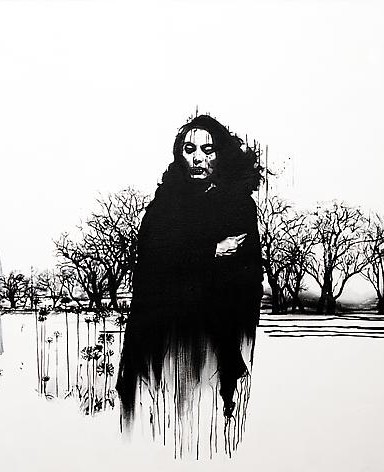Dubai,
B11, Alserkal Avenue Exit 43 of SZR Street 8, Al Quoz 1 Dubai, United Arab Emirates
11 March 2013 - 25 April 2013
Ayyam Gallery DIFC, Dubai, is pleased to announce a solo exhibition of Iranian artist Afshin Pirhashemi, who will present "The Wrong Women", a series of 12 new paintings.
Pirhashemi is fascinated by the role of women in contemporary Iranian society, and their relationships with the world around them. His monochrome paintings are dominated by female figures swathed in black, veiled and glamorously-attired. The women he depicts are far from submissive; they are independent, confident, and sexually aware, seemingly defying the conservative dress and values of Iranian society. With bold and often almost contemptuous gazes, they take ownership of their own bodies.
These ‘wrong’ women also share assertive gestures. In "Revenge", a woman aims a gun directly at the viewer. This woman is in control and will not allow herself to be perceived as a sexual object. Pirhashemi’s paintings serve as an antithesis to the idea of women as objects, an idea further reinforced by Pirhashemi’s inclusion of guns, cigarettes, and alcohol within his paintings – all symbols of an impure life for a woman in Iranian society, though things that men could partake in without reprimand or controversy.
In "I Love NY" (2012), though the subject’s head is covered by a traditional veil, she declares a connection to the wider world through the iconic American symbol floating at her side. Pirhashemi has much to say about the influence of America on the world, particularly the conflict it has brought to the Middle East. Though the country stated that its presence was an act of political salvation for Iraq and Afghanistan, Pirhashemi considers the intervention a ‘disaster’ and believes the damage is still in progress.
Pirhashemi often produces sequential studies of the same woman. This repetition of figures emphasises his fascination with how women present themselves to the world and the varying perceptions of social codes. In "Married", Pirhashemi depicts a sequential series of a woman engaged in a private ritual of arranging her hair. In the final pose she is seen fixing her veil to assume her role as wife. Pirhashemi asserts that this is not a negative portrayal of marriage as ‘the end of liberty’ but instead a woman choosing a life of commitment, a decision she makes for herself.
